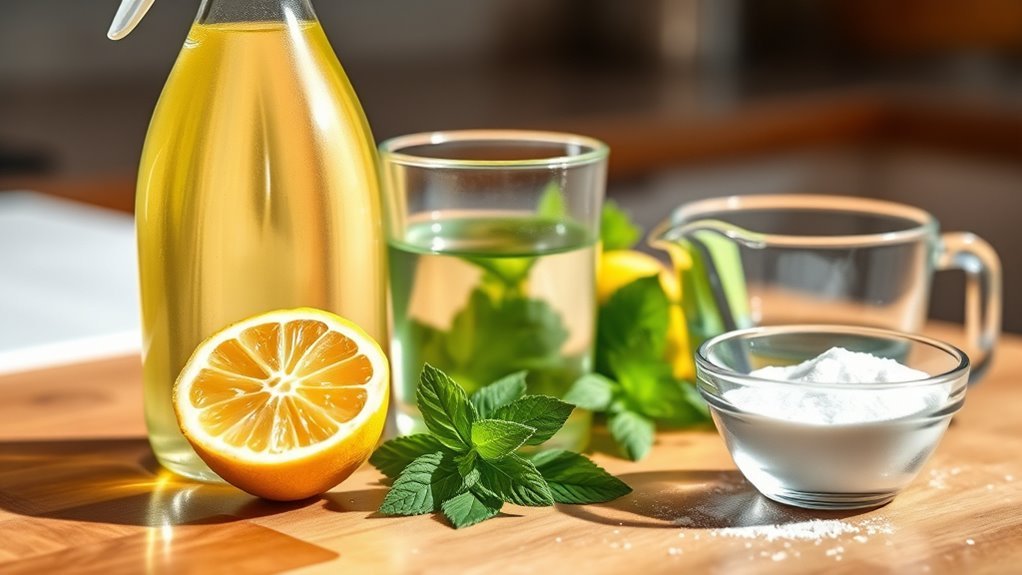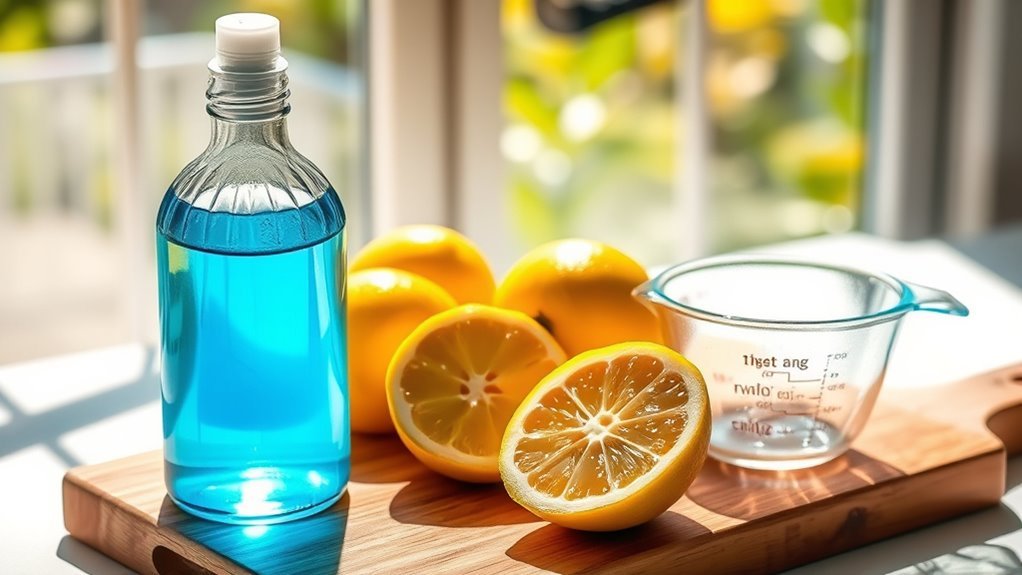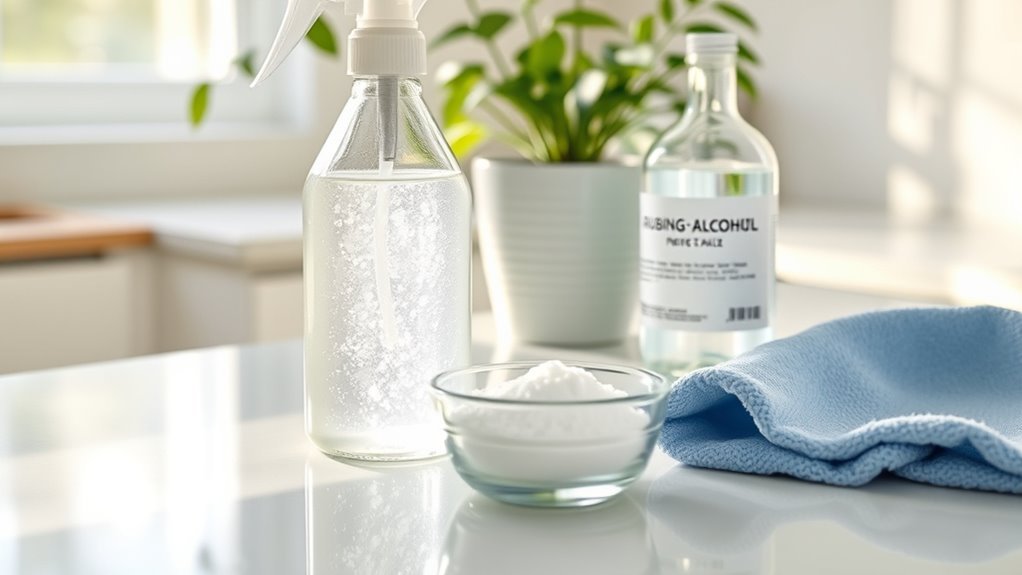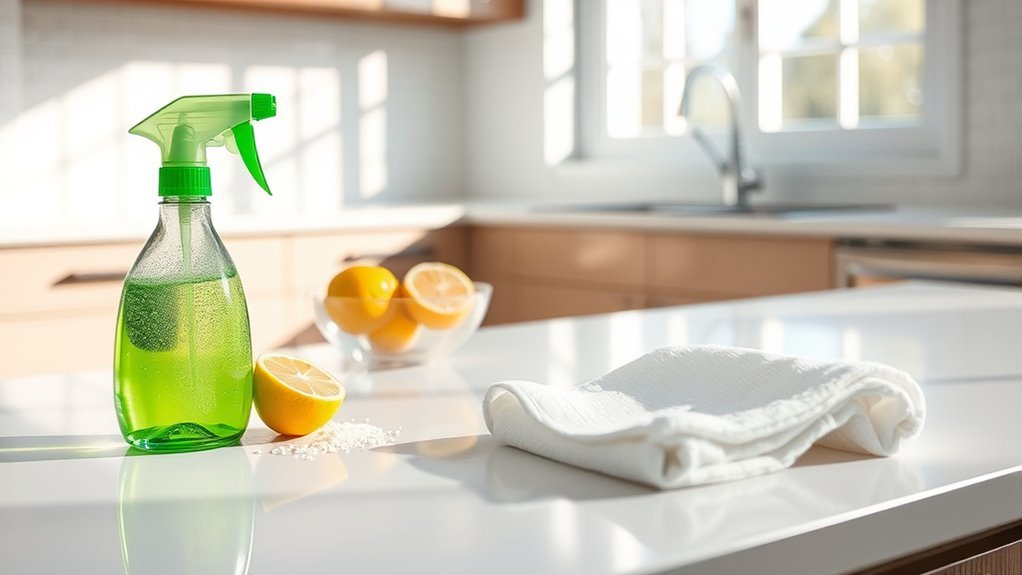How to Make Your Own Glass Cleaner at Home
You can easily make your own glass cleaner at home using simple ingredients like water, white vinegar, and a teaspoon of dish soap. Mix two cups of water with one cup vinegar in a spray bottle, add the soap, and shake gently. For a faster dry and extra shine, add a splash of rubbing alcohol. Use a microfiber cloth to avoid streaks. If you want to learn how to customize recipes or store your cleaner properly, there’s more helpful info ahead.
Essential Ingredients for Homemade Glass Cleaner

When making glass cleaner at home, you’ll need just a few simple ingredients that are likely already in your kitchen. Choosing eco friendly options not only helps the environment but also gives you control over what goes into your cleaner. White vinegar is a classic base known for its strong cleaning effectiveness against grease and grime. Adding water dilutes it to a safe, streak-free solution. For an extra boost, a few drops of essential oil can provide a pleasant scent without harsh chemicals. Cornstarch can also be included to enhance cleaning power and reduce streaking. By selecting these natural ingredients, you’re embracing a sustainable lifestyle while enjoying a glass cleaner that works as well as any commercial product. You get freedom from toxins, plus sparkling windows.
Tools and Containers Needed
After gathering your natural ingredients, you’ll want to have the right tools and containers on hand to mix and store your homemade glass cleaner effectively. Start with simple cleaning tools like a funnel for easy pouring and a measuring cup to guarantee accuracy. These help you maintain freedom from waste and mess. For container types, opt for spray bottles made of durable plastic or glass—glass is eco-friendlier and won’t absorb odors. Dark-colored bottles protect your cleaner from sunlight, preserving its effectiveness longer. Be certain your containers have a tight seal to avoid spills and keep your cleaner fresh. With the proper cleaning tools and container types, you’re set to enjoy a sustainable, effective glass cleaner crafted by your own hands.
Basic Recipe for an All-Purpose Glass Cleaner

You’ll only need a few simple ingredients to make your own all-purpose glass cleaner. I’ll walk you through each step to mix everything together quickly and safely. Once you have the right tools and ingredients, you’ll be ready to start cleaning with ease.
Essential Ingredients Needed
Clear, streak-free glass is easy to achieve with just a few simple ingredients you probably already have at home. To make your own glass cleaner, you’ll need water, white vinegar, and rubbing alcohol—these combo offers powerful cleaning without harsh chemicals. Adding a few drops of dish soap helps cut grease, making it perfect for windows, mirrors, and more. These ingredients are not only eco friendly options but also budget friendly solutions that save you money and reduce waste. By choosing natural components, you take control of what’s in your cleaner, avoiding toxins and supporting a sustainable lifestyle. Keep these essentials handy, and you’ll enjoy sparkling, spotless glass whenever you want, all while embracing freedom from commercial products.
Step-by-Step Mixing Process
A simple glass cleaner can be mixed quickly with just a few easy steps. First, gather your ingredients—water, vinegar, and a small amount of dish soap. Use precise measurement accuracy to guarantee the right balance: typically, two cups of water to one cup of vinegar and a teaspoon of soap. Pour these into a clean spray bottle. When it comes to mixing techniques, gently swirl the bottle instead of shaking vigorously to avoid excessive suds. This method keeps your cleaner effective and easy to spray. Label your bottle clearly, and you’re ready to enjoy a streak-free shine. Following these steps gives you the freedom to customize your cleaner anytime, using safe, simple ingredients without relying on commercial chemicals.
Vinegar-Based Cleaner for Tough Stains
When stubborn stains resist your usual glass cleaner, vinegar can be your best ally. Its natural acidity offers powerful stain removal without harsh chemicals, making it a top choice for those who value freedom from toxins. Here’s how to harness vinegar benefits for tough glass grime:
Vinegar’s natural acidity tackles tough stains gently and effectively, perfect for toxin-free glass cleaning.
- Mix equal parts white vinegar and water in a spray bottle.
- Spray directly on the stained area and let it sit for 5 minutes.
- Scrub gently with a microfiber cloth or soft sponge.
- Wipe clean with a dry cloth for a streak-free shine.
This simple vinegar-based cleaner empowers you to tackle stubborn stains effectively, keeping your glass surfaces sparkling and chemical-free.
Using Rubbing Alcohol for Quick Drying

If you want your glass cleaner to dry quickly without streaks, rubbing alcohol is a great ingredient to add. It evaporates fast and helps break down grime effectively. Just be sure to use it in a well-ventilated area and keep it away from flames for safety.
Benefits of Rubbing Alcohol
Rubbing alcohol is a key ingredient that helps your homemade glass cleaner dry quickly and streak-free. Its rubbing alcohol benefits go beyond just fast drying; it boosts your cleaning efficiency, making your glass surfaces shine effortlessly. When you use rubbing alcohol in your cleaner, you:
- Cut through grease and grime with ease.
- Evaporate moisture fast, preventing water spots.
- Disinfect surfaces, keeping your space healthier.
- Enhance the cleaner’s ability to leave glass crystal clear.
Quick Drying Properties
The fast evaporation of rubbing alcohol is what makes your glass cleaner dry so quickly without leaving streaks. When you use rubbing alcohol in your homemade solution, it evaporates almost instantly, allowing you to wipe down surfaces without waiting around. This quick evaporation not only saves you time but also guarantees enhanced clarity on your glass, giving you that crystal-clear finish you want. You won’t have to worry about smudges or residue, which often happen with slower-drying cleaners. Plus, the rapid drying means you can get back to your day freely, without the hassle of wet spots or streaks. By harnessing rubbing alcohol’s natural properties, you’re crafting a cleaner that’s efficient, effective, and perfect for a life on your own terms.
Safe Usage Tips
How can you guarantee safe use when working with rubbing alcohol in your glass cleaner? Prioritizing homemade safety guarantees you enjoy freedom while cleaning without risks. Follow these cleaning precautions to keep things safe and effective:
- Always work in a well-ventilated area to avoid inhaling fumes.
- Store rubbing alcohol away from heat and flames to prevent fire hazards.
- Use gloves to protect your skin from irritation or dryness.
- Keep the cleaner out of reach of children and pets to avoid accidental ingestion.
Adding Essential Oils for a Fresh Scent
Why not add a touch of freshness to your homemade glass cleaner? Adding essential oils not only elevates the scent but also brings natural antibacterial properties. You can experiment with essential oil blends to create unique scent combinations that suit your mood and style. Try mixing lemon and eucalyptus for a crisp, invigorating aroma or lavender and peppermint for a calming yet fresh vibe. Just a few drops go a long way, so start with 5-10 drops per cup of cleaner and adjust to your preference. This way, you keep control over the fragrance without overpowering your space. By customizing your scent combinations, you’re making your cleaning routine both effective and enjoyable, embracing freedom in every spray.
How to Adjust Recipes for Different Surfaces
When you want to clean different surfaces, you’ll need to tweak your glass cleaner recipe to avoid damage and get the best results. Adjusting ratios guarantees your cleaner suits each surface’s unique needs while maintaining surface compatibility. Here’s how you can customize your solution:
- For delicate surfaces like tinted windows, reduce vinegar to avoid stripping coatings.
- Use more water and less alcohol on wooden frames to prevent drying or warping.
- Add a small amount of mild soap when cleaning greasy stainless steel for better grime removal.
- Avoid essential oils on surfaces sensitive to oils, focusing on pure vinegar and water instead.
Tips for Streak-Free Cleaning
Although cleaning glass can seem straightforward, achieving a streak-free shine often requires a few key techniques. To enjoy crystal-clear windows, focus on streak prevention techniques like using a microfiber cloth instead of paper towels, which can leave lint behind. Choose ideal cleaning methods by spraying your homemade glass cleaner sparingly to avoid excess moisture that causes streaks. Wipe in a consistent pattern, such as vertical strokes followed by horizontal ones, to catch missed spots. Also, clean glass on a cloudy day or when the surface is cool to prevent the cleaner from drying too quickly and leaving marks. By mastering these simple tips, you’ll gain the freedom to keep your glass spotless and sparkling without relying on harsh chemicals or store-bought products.
Safe Storage and Shelf Life of Homemade Cleaners
Since homemade glass cleaners often contain natural ingredients without preservatives, you’ll want to store them properly to maintain their effectiveness and safety. Proper homemade cleaner storage guarantees your glass cleaner stays fresh and works well every time. Keep in mind, the cleaner shelf life typically ranges from one to two weeks.
Homemade glass cleaners need proper storage to stay effective and safe, usually lasting one to two weeks.
Here’s how to store your homemade glass cleaner safely:
- Use airtight, labeled spray bottles to avoid contamination.
- Store the cleaner in a cool, dark place away from direct sunlight.
- Shake well before each use to mix ingredients evenly.
- Discard any cleaner that changes color, smell, or texture to avoid ineffective or unsafe use.
Following these tips keeps your cleaner fresh and your freedom to clean naturally intact.
Häufig gestellte Fragen
Can Homemade Glass Cleaner Damage Tinted Car Windows?
You might worry if homemade cleaning solutions can damage your tinted windows, but you’ve got to be cautious. Some DIY cleaners contain vinegar or ammonia, which can actually harm the tint film over time. To keep your freedom to enjoy clear, streak-free windows without risking damage, avoid harsh chemicals and stick to gentle, tint-safe cleaning solutions. That way, your tinted windows stay protected and looking great, letting you drive stress-free.
Is It Safe to Use Homemade Cleaner on Eyeglasses?
You want clarity, but your eyeglass materials demand care. While homemade cleaners might seem freeing, not all ingredients suit every lens type. Some solutions can harm coatings or scratch delicate surfaces. Balancing your desire for natural cleaning with proper cleaning techniques is key. To keep your glasses safe, always check if ingredients like vinegar or alcohol are compatible with your lenses. When in doubt, opt for products designed specifically for eyeglass care.
How Do Homemade Cleaners Compare to Commercial Brands in Effectiveness?
When you look at the effectiveness comparison between homemade cleaners and commercial brands, you’ll find both have pros and cons. Homemade cleaners use simple cleaning ingredients like vinegar and baking soda, giving you freedom from harsh chemicals. While commercial cleaners often have specialized formulas for streak-free shine, your DIY mix can be just as effective if you tweak the ingredients right. It’s all about what fits your cleaning style and values.
Can I Use Homemade Glass Cleaner on Electronic Screens?
Did you know 90% of people damage their electronic devices by using the wrong cleaner? When it comes to screen cleaning, you should be cautious. Homemade glass cleaners often contain vinegar or alcohol, which can harm your screen’s protective coating. Instead, use a cleaner specifically designed for electronic devices or a microfiber cloth slightly dampened with water. This way, you keep your screens spotless without risking damage, giving you freedom to clean safely.
What Should I Do if My Cleaner Leaves a Residue?
If your cleaner leaves a residue, you’ll want to focus on residue removal by tweaking your cleaner ingredients. Sometimes, too much vinegar or soap can cause streaks or buildup. Try diluting the mixture or reducing harsh components. Also, use a microfiber cloth to wipe surfaces gently, as it helps lift residue without scratching. Remember, freedom in cleaning means experimenting until you find the perfect balance that leaves your glass spotless and streak-free!






